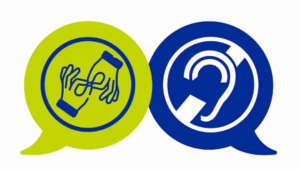An interpreter is someone whose primary role is to facilitate communication between people who speak different languages. They aim to fully convey what the original speaker says to another individual who does not share the language. Often this includes interpreting cultural cues to express the speaker’s intent. Therefore, a qualified interpreter is not just someone who is bilingual, but someone who has training in facilitating important communication. Interpreters play many roles and work in a variety of fields. A few examples of these roles include interpreting for legal proceedings, school meetings, and medical appointments.

One specific type of medical appointment for which interpreters frequently receive assignments is Early Intervention.
What is Early Intervention?
Early intervention is a state-run program that provides support and services for families with young children (aged 0-3 years); who have developmental delays or disabilities. Developmental disabilities can be physical, cognitive, communicative, social/emotional, and adaptive. Often, developmental disabilities might fall into more than one of these categories; as they relate to one another in complex ways.
A team consisting of social workers and an interpreter will provide early intervention services when necessary. The team aims to integrate these services into the family’s daily life; in a way that causes as little disruption as possible for the child. They develop a rapport with the family and form a professional relationship in order to aid as much as possible.
Because the state and federal governments fund early intervention services, the services are free for any families residing in Pennsylvania that need them. Congress created the current early intervention program in 1986 when they reauthorized the Education of All Handicapped Children Act.
They intended this legislation to reduce the impact of developmental delays and disabilities in young children and their families; maximizing their potential for independent living.
What Services Does Early Intervention Provide?
The first step in early intervention is to assess the child’s developmental milestones. The team compares the child’s development to the development of their peers and the team checks if the child meets standardized developmental milestones. For example, a parent might wonder when their child should be crawling, or become worried when the child is not crawling yet. If the evaluation reveals the need to continue with early intervention services, the team proceeds to evaluate their guardians and direct caregivers.
Through the interview process, the team uses an evaluation tool to assess concerns, priorities and resources.
The next step in the process is to write a family service plan. The team and the family work together to make decisions about how to proceed.
Some examples of decisions made in the planning stage include:
- Who participates in the treatment of the child?
- Where and when will the services take place?
- What are the major goals or outcomes expected of the treatment?
Why is it so important to have an interpreter?
An interpreter is necessary to facilitate face-to-face meetings, interviews and evaluations when a parent or child has limited English proficiency (LEP).
Support services must take place in the child’s natural environment. Normally, the services will take place in the family home, or the child’s school or nursery.
When one or more family member has limited English proficiency, having an interpreter present is crucial. This allows them to use their first language as they naturally would without interference from the support team; keeping the impact of the intervention low. Also, speaking in their native tongue allows the family to preserve their values and diversity. The informed consent of the parents is also necessary to continue with the service plan; which the team cannot obtain without the interpreter. Furthermore, one of the main objectives of early intervention is to provide education for the parent on how to best aid their child’s development. The presence of a qualified, professional interpreter enables LEP parents to receive the best possible education on their child’s developmental delay or disability.
Early intervention is just one of the many scenarios in which it is necessary to hire a professional interpreter. Global Arena has a network of qualified interpreters. Our interpreters have experience in a variety of different situations, including early intervention services.
Whether the nature of the assignment falls within the healthcare, legal, or educational industries, reach out to Global Arena to request an interpreter.
Note: this article focuses on early intervention services in Pennsylvania.
For more information about services available in your state, please refer to the following link:
https://www.autismspeaks.org/early-access-care/ei-state-info





2 Responses
First, thank you so much for this information you provide on your website, it is very valuable for me and staff working with interpreter particularly in early intervention, early childhood screening and evaluations were children -parents-therapist-interpreters are involved. I am Spanish trained interpreter I do use techniques and follow standards of practice when providing my services. However, I have some questions on this type of setting and I hope I get some answers.
Should interaction between children and therapist be interrupt by interpreter trying to render the message to children’s parent?
When children and therapist (evaluator) interact, should I (as an interpreter) interpret what is being said to the parent, so she/he knows what their kids is being asked?
When children and therapist interact should I interpret for the children the questions being asked by the therapist.
Should therapist evaluate language barriers on the children before getting early childhood screening, meaning which language does the kids is more proficient on and what language should I use when giving him instructions for the test. So, the therapist have an idea if the interpreting services are needed during the evaluation where interpreter has to render the oral input/message to the kid or to the therapist?
If interpreter in needed during the evaluation process, interaction between therapist and children, will that affect the results of the test if children get nervous, shy, no willing to participate because of the presence of the interpreter.
Should I wait for the therapist to give me instructions to when interpret important questions for children?
What if the children feel uncomfortable and no being participant during the evaluation or acting shy because of the presence of the interpreter and interpretation in different languages, how should interpreter participate/act to avoid or these issues?
When asking background questions, family questions, health history to the children’s parents, should the children being evaluated be present at the moment of the questionnaire, even though questions my make parties feel uncomfortable.
During the evaluation procedure or therapist children interaction, should interpreter be outside of the room and wait until further instruction from the therapist. Should interpreter only be needed during parent and therapist interaction, evaluation’s results, screening overview, parents’ questions and answers with the therapist so in that way we release/eliminate pressure, anxiety on the children being evaluated.
I do thank you so much for taking your time reading these questions and giving me some tips.
This above comment was so interesting that we decided to create a new article addressing the questions posted.
The Global Arena Team